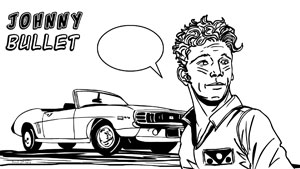|
|
 |
Rosado drew one reasonable conclusion: "Ewoks. Eat. People."
Perhaps this was never the intention of George Lucas, but since the advent of the prequels, it's obvious to most Star Wars fans that there are certain gaps in his creativity.
Nevertheless, let's examine one aspect of the stormtroopers which may be equally as subtle. It is established in Episode II: Attack of the Clones that a great army of clones is being assembled. Rosado explains that with the death of Jango Fett in Episode II, the source of usable DNA material was lost, and the clone troopers had a limited lifespan. By the time Episode IV: A New Hope begins, Imperial stormtroopers consist of about 60 percent clones.
 |
A clone is often viewed, in Orwellian terms, as an "unperson." As such, they, along with androids and robots, are often handy in science fiction stories as disposable people. In 1921, a play entitled RUR (Rossum's Universal Robots) by Czechoslovakian Karl Capek premiered, and introduced the term "robot" into the world lexicon. In the story, an industrialist has created artificial people, only to have his daughter lead a movement intended to emancipate the robots. Of course, to her father, such an idea is akin to liberating a washing machine or automobile.
Other authors have explored the notion of artificial life and its worth, creating entire races of robots, androids and clones to be subjugated, while genuine humans are elevated to a god-like status. Examples would be Isaac Asimov's I, Robot, and Philip K. Dick's Do Androids Dream of Electronic Sheep?, which was adapted to film in 1982 as Bladerunner starring Harrison Ford.
Which brings us back to George Lucas and the Star Wars saga. As clones, Lucas has created what may be interpreted as a disposable human, and if indeed most of the Imperial stormtroopers throughout all six films are clones, we have again an example of Lucas attempting to polish the image of his heroes. I believe this undermines the scope of the Star Wars mythos, creating a pure hero with the liberty to slay his enemies without sullying his or her hands with any "real" person's blood.
Anakin's journey to Dark Side and back is all very well and good, but Han's is equally valid. In 1977, we first met Han Solo as a greedy, self-serving scoundrel. He shoots Greedo because he knows he's in a kill-or-be-killed situation, held at gunpoint and with only one option. At the end of the film he rescues Luke from being blown out the sky and enabling the rebels to win the day. In 1997, with the release of the special edition, Han's journey to being a better man is negated by having Greedo shoot first.
The argument could be made that killing stormtroopers isn't really killing at all. They are merely the next step up from the battle droids of Episode I. Some clone troopers inevitably hold higher ranks, thereby establishing that some clones are more equal than others. Ergo, by gifting those beings with sentient thinking and the ability to reason, we are elevating them above machine status, or animal to full-fledged human.
 |
Now pass the bantha sauce. I'm hungry.
Praise and adulation? Scorn and ridicule? E-mail me at philip@comicbookbin.com
© Copyright 2002-2026 by Toon Doctor Inc. - All rights Reserved. All other texts, images, characters and trademarks are copyright their respective owners. Use of material in this document (including reproduction, modification, distribution, electronic transmission or republication) without prior written permission is strictly prohibited.

